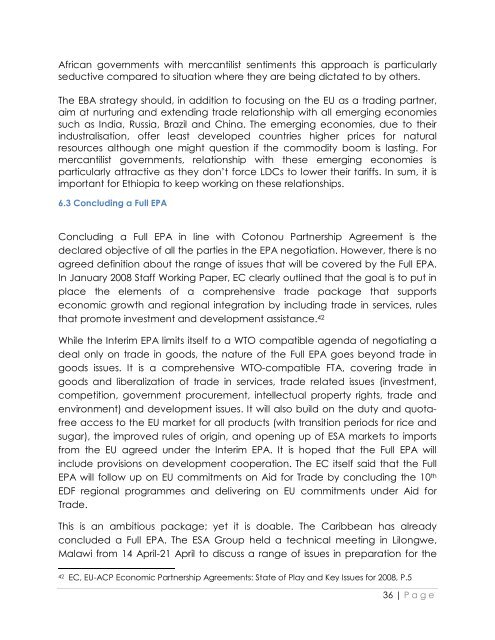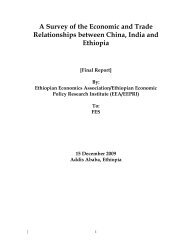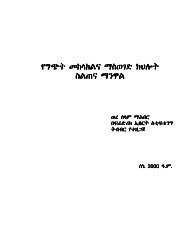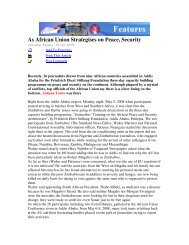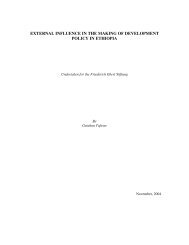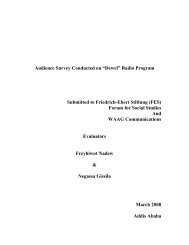Ethiopia and EPA Negotiation 2008 - FES Ethiopia
Ethiopia and EPA Negotiation 2008 - FES Ethiopia
Ethiopia and EPA Negotiation 2008 - FES Ethiopia
Create successful ePaper yourself
Turn your PDF publications into a flip-book with our unique Google optimized e-Paper software.
African governments with mercantilist sentiments this approach is particularly<br />
seductive compared to situation where they are being dictated to by others.<br />
The EBA strategy should, in addition to focusing on the EU as a trading partner,<br />
aim at nurturing <strong>and</strong> extending trade relationship with all emerging economies<br />
such as India, Russia, Brazil <strong>and</strong> China. The emerging economies, due to their<br />
industralisation, offer least developed countries higher prices for natural<br />
resources although one might question if the commodity boom is lasting. For<br />
mercantilist governments, relationship with these emerging economies is<br />
particularly attractive as they don’t force LDCs to lower their tariffs. In sum, it is<br />
important for <strong>Ethiopia</strong> to keep working on these relationships.<br />
6.3 Concluding a Full <strong>EPA</strong><br />
Concluding a Full <strong>EPA</strong> in line with Cotonou Partnership Agreement is the<br />
declared objective of all the parties in the <strong>EPA</strong> negotiation. However, there is no<br />
agreed definition about the range of issues that will be covered by the Full <strong>EPA</strong>.<br />
In January <strong>2008</strong> Staff Working Paper, EC clearly outlined that the goal is to put in<br />
place the elements of a comprehensive trade package that supports<br />
economic growth <strong>and</strong> regional integration by including trade in services, rules<br />
that promote investment <strong>and</strong> development assistance. 42<br />
While the Interim <strong>EPA</strong> limits itself to a WTO compatible agenda of negotiating a<br />
deal only on trade in goods, the nature of the Full <strong>EPA</strong> goes beyond trade in<br />
goods issues. It is a comprehensive WTO-compatible FTA, covering trade in<br />
goods <strong>and</strong> liberalization of trade in services, trade related issues (investment,<br />
competition, government procurement, intellectual property rights, trade <strong>and</strong><br />
environment) <strong>and</strong> development issues. It will also build on the duty <strong>and</strong> quotafree<br />
access to the EU market for all products (with transition periods for rice <strong>and</strong><br />
sugar), the improved rules of origin, <strong>and</strong> opening up of ESA markets to imports<br />
from the EU agreed under the Interim <strong>EPA</strong>. It is hoped that the Full <strong>EPA</strong> will<br />
include provisions on development cooperation. The EC itself said that the Full<br />
<strong>EPA</strong> will follow up on EU commitments on Aid for Trade by concluding the 10 th<br />
EDF regional programmes <strong>and</strong> delivering on EU commitments under Aid for<br />
Trade.<br />
This is an ambitious package; yet it is doable. The Caribbean has already<br />
concluded a Full <strong>EPA</strong>. The ESA Group held a technical meeting in Lilongwe,<br />
Malawi from 14 April-21 April to discuss a range of issues in preparation for the<br />
42 EC, EU-ACP Economic Partnership Agreements: State of Play <strong>and</strong> Key Issues for <strong>2008</strong>, P.5<br />
36 | P a g e


